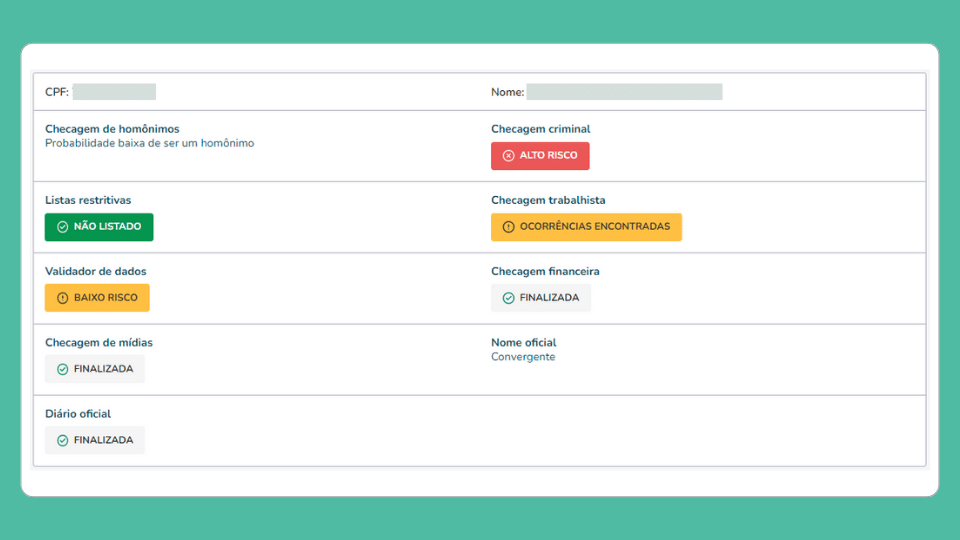Sanctions lists: 10 americans and international examples
Published on
06/10/2022
| Updated on
19/11/2025
Topics Covered
Sanctions lists (or restrictive lists) are national and international databases that maintain a record of people and companies involved in illicit practices such as slave-like labor, money laundering, terrorist financing, environmental crimes, among others.
For a company, it is very important to build a high-quality reputation that offers credibility and security to its audiences. After all, these are the two necessary for the maintenance of your company’s constant growth.
This means torganizations need to protect their data as much as possible, as well as the information of their customers and partners. They can do this in many ways, for example, through background check when closing partnerships, hiring, or even selling a solution or product.
What are sanctions lists?
When a company or person is involved in some type of illicit or criminal activity, their name is registered in a specific type of list, called sanctions lists (or restrictive lists). Through this type of listing, it is possible to check and analyze data and information regarding the person or organization with whom you are interested in building a partnership or bond.
An example is the sanctions list of Politically Exposed Persons (PEPs).
Thus, these lists function as a document that, in addition to gathering various types of national and international data on companies and people, also ensures transparency, security for you, your customers, and compliance in your company.

Data and information in a sanction list
Sanctions Lists register the names of companies and individuals who have practiced or are involved in some type of illegitimate act. Some of the main acts include:
- Money Laundering;
- Encouragement or practice of slave-like labor;
- Execution of activities against the environment;
- Integration and participation in terrorist actions.
Types of sanction list and examples
Sanctions Lists can be national and international. This classification changes according to the origin of the data found and registered in it.
That is, if the data regarding your customer, supplier, and employee are external, the lists are called international sanctions lists. However, if the information found has local origin and territorial validation, they are called national sanctions lists.
This division is carried out by different organizations. We have separated 10 types of Sanctions Lists for you, dividing them into international and national to help your understanding. Check them out below:
National sanctions lists
- SDN List (Specially Designated Nationals and Blocked Persons List)
- SSI List (Sectoral Sanctions Identifications List)
- FSE List (Foreign Sanctions Evaders List)
- NS-PLC List (Non-SDN Palestinian Legislative Council List)
- NS-ISA List (Non-SDN Iran Sanctions Act List)
- NS-CMIC List (Non-SDN Chinese Military-Industrial Complex Companies List)
- IFSR List (Iranian Financial Sanctions Regulations List)
- Entity List
- Denied Persons List
- Unverified List (UVL)
- AECA Debarred List (Arms Export Control Act Debarred Parties)
- ITAR List (International Traffic in Arms Regulations – Debarred Parties)
International sanctions lists (Brazil)
- National Registry of Punished Companies (CNEP), by the CGU;
- Registry of Employers (Slave Labor “Dirty List”);
- Registry of Impeded Non-Profit Private Entities (CEPIM), by the CGU;
- List of Responsible Parties with Accounts Judged Irregular, by the TCU.
- European Union List;
Official Lists vs. unofficial Lists
In addition to the classification regarding their national and international origin, sanctions Lists can also be classified as official and unofficial.
In this case, the organization occurs as follows: official sanctions lists concern practices regulated by public administration, therefore, activities that are considered illicit under the legislative sphere, while unofficial sanctions lists are used in an unregulated manner and influenced by media instruments, issues disseminated by the media.
This means that unofficial Sanctions Lists, also called private lists, take into account activities that are not necessarily considered illicit and do not conflict with laws, but also behaviors considered incorrect, socially or politically, unethical, and immoral attitudes, from the perspective of current society.
Read also: Background check: what it is, its importance, and types of checks
How do sanctions lists help your company?
The main objective and utility of official national and international watchlists is to help your company guarantee security, in a fast, precise, and unified way.
Thus, they function as facilitating instruments for checks that provide the user with all the essential information and documents for the understanding and analysis of risks and problems that your organization may face or become involved in.
In this way, watchlists present great and important advantages for adoption, benefiting and stimulating the protection of your company in situations such as fraud and scam prevention, continuous analysis of business relationships, optimization of data checking, and guaranteeing compliance.
Relationship between Sanctions Lists and Compliance
Compliance consists of preventing threats, risks, and illegalities to your company. Thus, it can be summarized as the set of habits and practices that contribute to and make your organization’s processes function according to laws, public guidelines, and with respect to the LGPD (General Data Protection Law).
See more about this in What is Compliance? Understand, see the types, and how to apply it
In this sense, this is precisely the fact responsible for connecting the use of sanctions Lists to compliance in your company. After all, this data tool allows you to know and analyze the possible relationships existing between your organization, customers, and suppliers, thus preventing involvement in crimes and risks that harm the regularity and image of the organization.
How to access this type of source?
Technology can greatly help you access Sanctions Lists, as through it, it is possible to use these lists as a data source. This can be seen, for example, in our Background Check solution.
In our technology for verifying and checking people and companies, we use sanctions lists as one of the various data sources. Thus, we can access crucial and indispensable information which, flagged for you on our platform, assists in assessing the risk of hiring, partnering, and data release.
How background check works

Our technology allows the verification and checking of people and companies in a more optimized, secure, and transparent way when hiring, selling, closing partnerships, or following market regulations.
As seen above, we use different types of sources. Among them, besides watchlists, are employment sources, financial sources, registration status, registration data, labor debts, and others.
Thus, through our high-tech product, we perform a complete sweep of more than 200 public and private data sources such as name and national ID (CPF) for checking individuals and tax ID (CNPJ) for verifying companies.
This verification occurs in an automated way, on a single platform and in a few minutes, optimizing and consequently strengthening the processes of your company’s compliance and anti-money laundering team.
Want to know more about this solution and have automated access to Sanctions Lists? Access our site and request a demo!
Share:

Maria Eduarda
Especialista em Produção de Conteúdo sobre Gestão de Riscos na BGC Brasil e estudante de Comunicação Social em Universidade Estadual do Rio de Janeiro.
Related posts
Free materials
Technology in HR
How to automate processes and make them faster and safer
E-book
Background Check
7 ways to apply it in your company
E-book
10 pillars of a
Compliance Program
E-book
Best practices guide for
Money Laundering Prevention (MLP)
E-book
The Future of HR
7 Global Trends You Should Adopt as Soon as Possible
E-book
